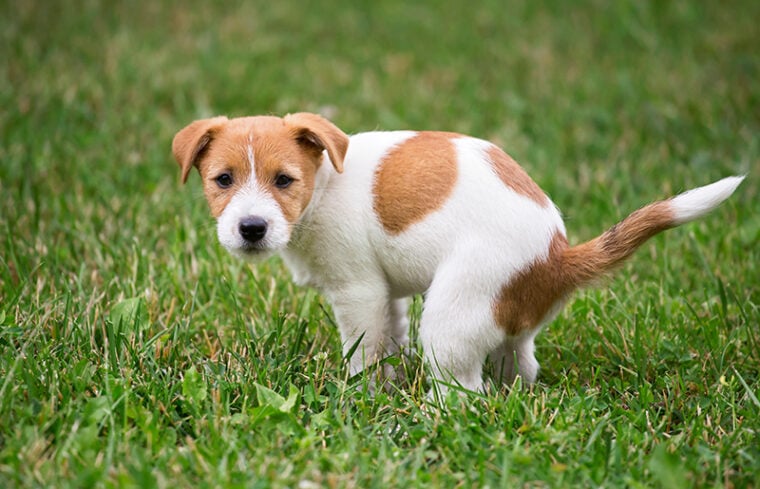
The mucus in your dog’s stool is usually normal and has the role of lubricating the colon to facilitate the elimination of feces. When the mucus is excessive or has streaks of blood or parasites and/or your dog shows other clinical signs (vomiting, diarrhea, or loss of appetite), it is a clue that something is wrong. Mucus in stool can also occur when you have changed your dog’s diet or given them hard-to-digest foods, such as bones and fats. From a pathological point of view, mucus can be a sign of intestinal inflammation.
In this article, we discuss what mucus in dog stool is, what causes it, other clinical signs that your dog might show, and home remedies that you can use to improve gastrointestinal problems.
What Is Mucus in Dog Poop?
Mucus is a gelatinous, thick substance that has a role in protecting and lubricating the organs and tissues in the body. In the gastrointestinal tract, it lines the intestines, acting as a barrier and lubricant and helping the contents pass easily through the intestines. Researchers1 define mucus as the first line of defense against bacteria and other microorganisms.
It is secreted by the cells of the large intestine and consists of water, mucins, proteins, bile salts, enzymes, lipids, cells and cellular debris, and other materials. It has the consistency of jelly and is usually transparent, but it can have other colors.
When the amount of mucus in your dog’s stool is small, it typically goes unnoticed. Another normal cause for the appearance of mucus in your dog’s poop is when they do prolonged physical exertion, as movement stimulates the production of mucus in the intestine and facilitates elimination.
When mucus is present in large quantities, it can indicate a health problem, especially if it is accompanied by other clinical signs, such as vomiting, diarrhea, and appetite loss.
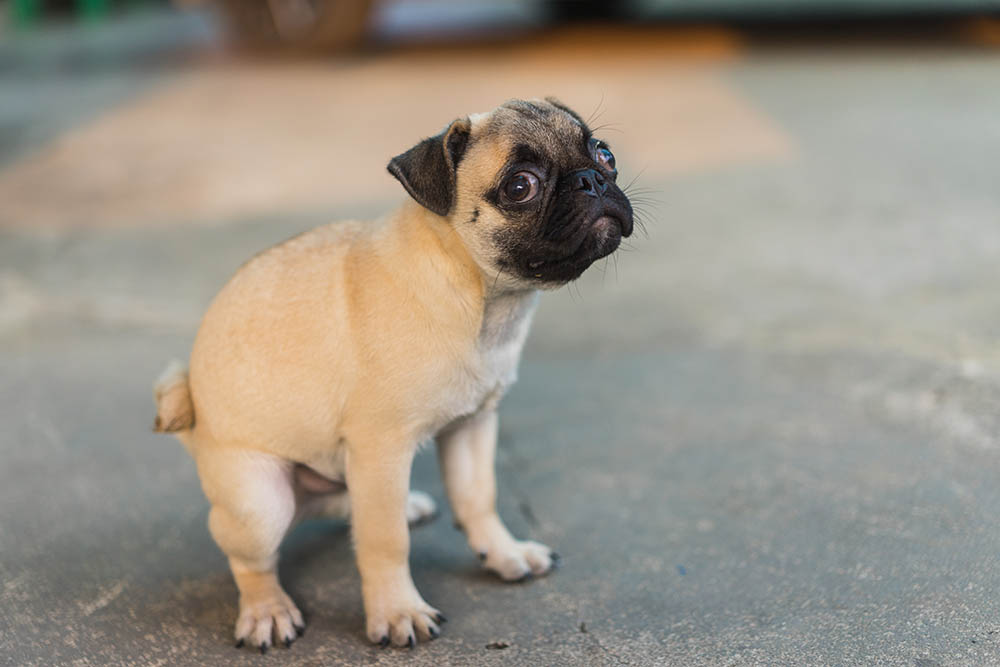
When Should I Get Worried If I See Mucus in My Dog’s Poop?
Normal mucus in your dog’s stool should be clear or white and in small amounts. If your dog has eaten grass, the mucus can have a green color. But grass consumption is not the only cause; certain bacterial or parasitic infections can also lead to green mucus.
Although the clinical signs depend on the condition that causes the abnormal appearance of mucus in feces, the same ones can be observed in several pathologies. If the mucus in your dog’s stool has pathological causes, here are the clinical signs that you can observe:
If your dog shows one or more of these clinical signs, a visit to the vet is the best decision. They can identify the cause of the mucus in your dog’s feces and establish an appropriate diagnosis through various tests, such as:

What Are the Causes of Mucus In Dog Poop?
The causes of mucus in your dog’s poop are multiple and can be simple or complex (severe). Medical conditions in which mucus may occur in your dog’s stool are as follows.
The 8 Reasons Your Dog Has Mucus in Their Poop
1. Parasitic diseases
Intestinal parasites and giardia can cause the following clinical signs:
In severe cases, intestinal invagination can also occur.
Certain intestinal parasites, such as tapeworms, can also be transmitted to humans and other pets. Those most prone to intestinal parasitic diseases are puppies. Deworming your dog should take care of the problem.
2. Inflammatory Bowel Disease (IBD)
IBD is a group of gastrointestinal diseases. It can affect dogs of any age but is more common in middle-aged and older dogs. Some breeds are more prone to IBD, such as the German Shepherd, Shar-Pei, French Bulldog, and Irish Setter.
3. Hemorrhagic Gastroenteritis
Hemorrhagic gastroenteritis, or acute hemorrhagic diarrhea syndrome (AHDS), is a medical condition with sudden onset characterized by the presence of blood in vomit and diarrhea. The dominant clinical sign is diarrhea in large quantities, with bright red blood. Abdominal pain, reduced appetite, lethargy, or fever may also occur. The causes for this condition are multiple and include toxins, infectious diseases (e.g., parvovirus), gastric and intestinal ulcers, changes in diet, etc. Small and toy breeds are most prone.
4. Intestinal Infections
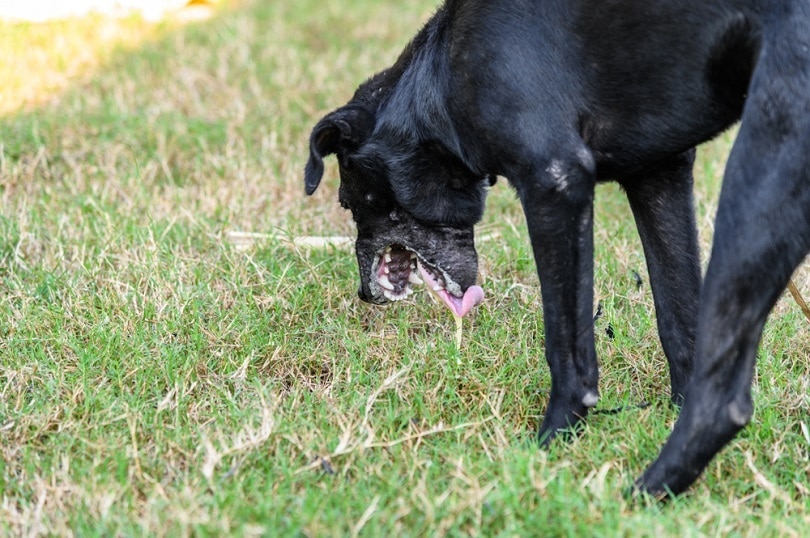
Intestinal infections can be bacterial (Salmonella spp., E. coli, etc.), viral, or fungal. You can notice fever, abdominal pain, bloating, vomiting, mucus, and diarrhea. In most cases, supportive treatment and general antibiotics/antifungals will treat the problem. It can occur in any dog breed of any age.
5. Irritable Bowel Syndrome
Irritable bowel syndrome is a condition that causes inflammation of the intestinal mucosa and can be a chronic or long-term condition. Clinical signs include diarrhea and digestive problems that cause discomfort, often without any other obvious cause. The irritation of the colon can be caused by various medical reasons, but it can also be triggered by stress. In this case, it is important to treat the medical problem that may be the basis of this condition.
6. Food Intolerance
Food intolerance can lead to the presence of mucus in the stool and bloating, vomiting, or diarrhea. This problem is usually treated by changing your dog’s food.
7. Dietary Indiscretion and Intestinal Obstruction
If your dog eats spoiled food, hard-to-digest food (bones, fat), or non-edible items, it can disturb their digestive tract and cause mucus in the stool, vomiting, diarrhea, or constipation. In severe cases, surgery may be necessary to remove the foreign object.
8. Gastrointestinal Cancer
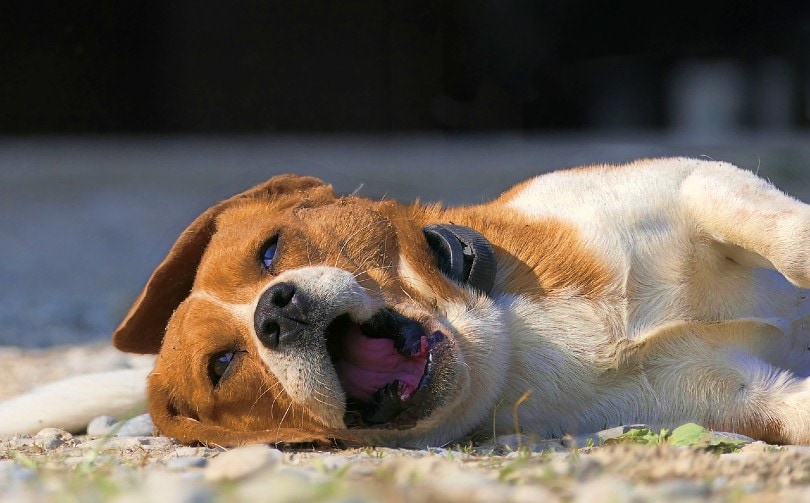
Gastrointestinal cancer is one of the most frequently diagnosed cancers in dogs. It can occur in any breed of any age, but old dogs are more prone. Dogs with intestinal cancer may present mucus and blood in their feces, sudden weight loss, lethargy, decreased appetite, and abdominal swelling.
How Do I Care for a Dog With Mucus in Their Poop?
It is recommended to take your dog to the vet when you see an excessive amount of mucus in their poop, especially if you notice other clinical signs, such as blood in their stool, diarrhea, or vomiting. Diarrhea and vomiting can lead to dehydration, which can have severe consequences on the body.
If your dog has mucus in their feces in moderate amounts but seems healthy and does not show any of the previously mentioned signs, you can try home remedies, such as preparing a bland diet. Ideal foods are boneless and skinless chicken with rice and vegetables (pumpkin, potatoes, and carrots).
Other home remedies to try are:
Although dogs that have mucus in their stool but do not show other clinical signs do not need medication, administering probiotics can help. Probiotics maintain and improve the health of the intestinal microflora, which help digestion and provide protection against the actions of harmful bacteria.
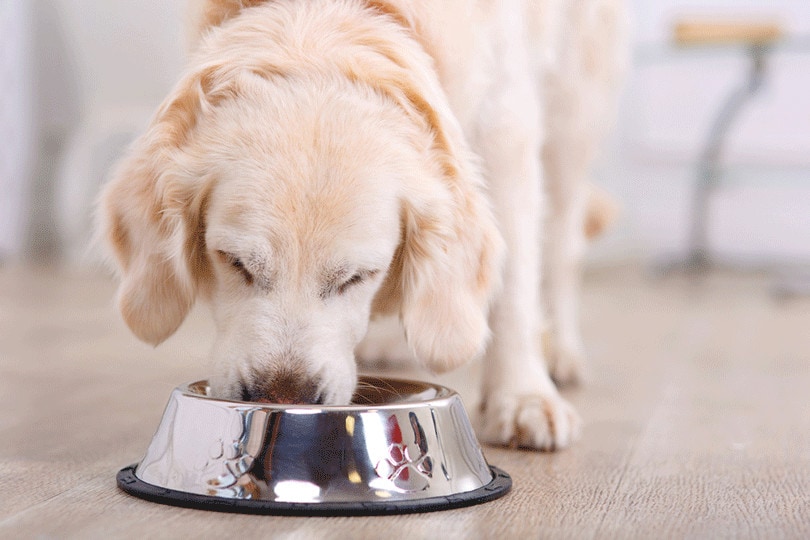
Frequently Asked Questions (FAQs)
Why Does My Dog’s Poop Have Yellow Mucus After They Eat Chicken and Rice?
Yellow mucus and yellow stool after your dog has eaten chicken and rice can indicate food intolerance. In severe cases, in addition to mucus, you can notice other signs, such as vomiting and/or diarrhea. In such cases, if changing the food does not solve the problem, it is necessary to take your dog to the vet.
What Does Poop Look Like From Dogs With Pancreatitis?
Poop that’s a pale or yellow color with an oily appearance can be noticed in dogs with pancreatic problems. The pancreas plays an important role in the digestion process, as it secretes enzymes that help absorb nutrients from food. The alteration of this function can lead to a malabsorption syndrome, with diarrheal, watery, greasy-looking, and foul-smelling stools. The treatment consists of the administration of pancreatic enzymes and changing the diet.
Conclusion
Mucus in small amounts in your dog’s stool is normal. When the amount and frequency increase, blood occurs, or your dog shows other clinical signs, such as vomiting, diarrhea, fever, loss of appetite, etc., this is a pathological situation. The reasons that abnormal mucus occurs in dogs’ poop are multiple and include parasitic diseases, intestinal infections, inflammatory diseases, cancer, and others. If your dog has mucus in their stool but no other signs, you can try home remedies, such as preparing a bland diet with chicken, rice, and vegetables, and administering probiotics. You can also try feeding your dog more often with smaller portions. If none of these home remedies improve your dog’s condition, take them to the vet.
Featured Image Credit: Reddogs, Shutterstock







